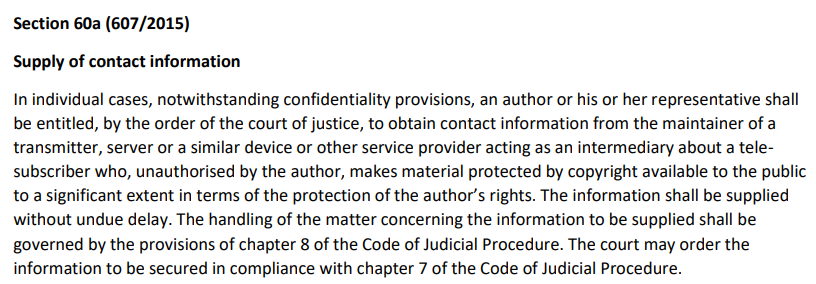 In many countries around the world there are long-established, well-worn legal processes that allow rightsholders to obtain the personal details of suspected pirates.
In many countries around the world there are long-established, well-worn legal processes that allow rightsholders to obtain the personal details of suspected pirates.
Requirements vary from region to region but when certain conditions are met, few courts deny genuine copyright holders the ability to enforce their rights under relevant law. One of the most fundamental requirements is that the entity making the claim has the necessary rights to do so, yet over the years there has been no shortage of attempts to the contrary, sometimes with disastrous results.
Law Firm Seeks Rightsholder-Like Rights
In an application submitted to Finland’s Market Court on March 15, 2024, the law firm Hedman Partners Oy sought a court order to compel an unnamed internet service provider to provide the personal details of an unspecified number of subscribers.
According to Hedman’s application, all are suspected of sharing copyrighted movies via BitTorrent, without first obtaining permission from two Danish rightsholders; Mis. Label ApS and Scanbox Entertainment A/S.
Hedman Partners are well known for their work in the piracy settlement business in Scandinavia. The company fully understands the standards required before courts will issue a disclosure order. However, for reasons that aren’t made clear, the law firm would prefer to deal with these cases from a position of greater authority. This application appears to have served as the testing ground to determine whether that’s possible under Finland’s Copyright Act.
Market Court’s Decision
“The applicant is a Finnish law firm whose mandate is to manage and represent the copyrights of its clients’ film works in matters involving the distribution of these film works in a peer-to-peer network. The applicant uses the authority to speak for the right holders of the film works that are the subject of the application,” the court’s decision begins.
“The applicant’s position as a representative of rights holders is established and is based on a long business relationship, in which the applicant has acted as the exclusive representative of rights holders in Finland in matters concerning violations of these rights in the peer-to-peer network. The rights holders have also confirmed in writing their intention to continue this business relationship for the time being.”
The written statements from the rightsholders are substantially identical; their names are the only detail to set them apart.
[[Mis. Label ApS] / [Scanbox Entertainment A/S]] declares that Hedman Partners Attorneys Ltd shall exclusively, for the foreseeable future, supervise illegal online distribution of the works, particularly those taking place in peer-to-peer networks. [Hedman] will take actions to identify the owners of the internet connections used in the infringements, to the extent they are related to infringements from Finnish internet connections.
Hedman’s approach to the court centers on terminology found in Finland’s Copyright Act which, under certain conditions, allows a party other than the main rightsholder to file an application for a disclosure order.

The Market Court notes that it has consistently interpreted the term ‘representative’ in Section 60a to mean a separate power of attorney, adding that the applicant must have legal authority to file applications such as that filed by Hedman.
According to its decision, Hedman has no legal authority under Section 60a.
Market Court’s Reasoning
The court says that Hedman has not stated that the films’ production companies, Mis. Label, or Scanbox have granted the law firm certain exclusive rights, such as the exclusive right to make the works available to the public via BitTorrent.
It must therefore determine whether the law firm still has ‘legal authority’ to obtain alleged infringers’ identities “as a representative of the authors of the works” as defined under Section 60a.
Citing preliminary decisions of the Supreme Court in KKO 2004:18 and KKO 2018:8, the Market Court notes that there is no general rule on ‘legal authority’ in the judicial process.
As a result, legal authority in disputes “belongs to the parties to the contested legal relationship, and as a general rule, the parties cannot, by their ordering actions, create a position for a third person in which the third person exercises justice in his own name over the rights of the party in question.”
The Market Court continues by citing the Supreme Court’s preliminary decision in KKO 2022:39, as shown below.

“Taking the above into account, the Market Court considers that the reference to the author’s representative in Section 60a of the Copyright Act is not intended to provide an exception to the so-called process mandate prohibition applicable to the present matter,” the Market Court concludes.
Benefits Unclear, But Unlikely to Have Benefited Internet Users
Critics believe that piracy settlement operations that become inseparable from their third-party legal teams are more likely to aggressively push for larger cash settlements, especially as part of a revenue sharing arrangement. In this matter, attempting to transform a law firm into an entity with rightsholder-like powers, may even be unprecedented.
The benefits aren’t immediately obvious, but whatever they might’ve been, they wouldn’t have helped those targeted by the disclosure order, that much is certain.
The decision, issued by Market Court Judges Ville Parkkari, Tobias von Schantz, and Liisa Kauramäki, may be appealed to the Supreme Court before June 18, 2024. The disclosure application itself was not examined.
The Market Court’s decision is available here (MAO:236/2024)
From: TF, for the latest news on copyright battles, piracy and more.
Powered by WPeMatico
